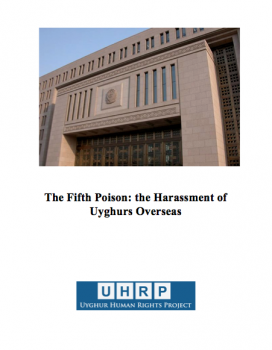The Fifth Poison: the Harassment of Uyghurs Overseas

For immediate release
November 28, 2017 2:00 pm EST
Contact: Uyghur Human Rights Project +1 (202) 478 1920
The Chinese authorities’ recent coercion of Uyghur students studying abroad to return home has drawn international attention to the government’s campaign of harassment and control of Uyghurs living outside of China. However, this campaign is a long-standing one and has created a climate of fear even in Western countries. A new report from the Uyghur Human Rights Project (UHRP) seeks to document the various methods the Chinese government employs to monitor and harass Uyghurs living overseas.
“Fear of the consequences of speaking out against the Chinese government follows Uyghurs as they travel or immigrate abroad,” Omer Kanat, UHRP’s director said. “The governments of nations which host Uyghur populations should push back against Chinese government activities directed against Uyghurs on their soil.”
The Chinese government has long sought to control the narrative of Chinese politics within Chinese communities overseas though tools including the education departments of their embassies and consulates, using them to disrupt events held by activists on college campuses and elsewhere. For dissident groups, monitoring and control can take more direct forms. The targets of this harassment include Uyghur and Tibetan rights activists, Chinese democrats, Taiwanese independence advocates and Falun Gong practitioners. Together the Chinese authorities refer to these targeted groups as the “Five Poisons.”
The Chinese government has also tried to influence and put pressure on foreign governments to label Uyghurs as “terrorists” and to prevent their free movement, even after they have become citizens of other countries. As China builds closer security relationships with countries around the world, including in Central and South Asia and the Middle East, these countries have used their own security forces to attempt to shut down political activities among Uyghurs in their nations, or even detain and deport Uyghurs living legally in their territory.
The goal of the Chinese government’s harassment is to discourage and disrupt political activism among Uyghurs living abroad, replicating the system of control that exists in their homeland. Threatening retaliation against family members who remain within the borders of China is one of the Chinese government’s primary tools. This retaliation can include everything from their family members being prevented from leaving China by being denied passports, to putting their jobs and educations at risk, to being subjected to imprisonment. This means Uyghurs living overseas are often faced with the possibility of never being able to see or speak to their family members again, or having them targeted for their non-cooperation.
Technological development has opened a new front in the Chinese authorities’ surveillance of the Uyghur diaspora. Email and the internet have created new opportunities to monitor the activities of Uyghur activists, who find themselves frequently targeted by attempts to gain access to their communications. This makes communicating with Uyghurs still in China very risky, as phone calls can be monitored more easily than in the past.
These tactics undermine Uyghurs’ ability to enjoy their legal rights even after they leave China. Fear that their families back home could suffer for their political opinions or activities creates an atmosphere of insecurity that can make Uyghurs living abroad reluctant to speak up about their experiences or the general situation in East Turkestan. This has a negative impact on the outside world’s knowledge of the region, undermining efforts to improve the human rights situation there. UHRP believes that nations that stand for the rule of law must take the harassment of dissidents and ethnic minorities by foreign powers seriously as a security threat.
The Fifth Poison: the Harassment of Uyghurs Overseas can be downloaded at: https://uhrp.org/docs/The-Fifth-Poison-The-Harrassment-of-Uyghurs-Overseas.pdf
